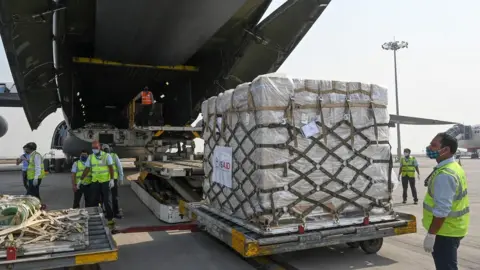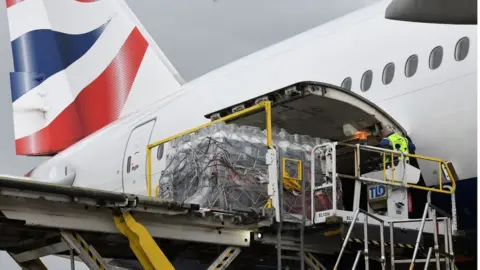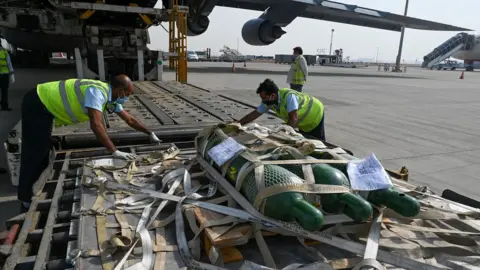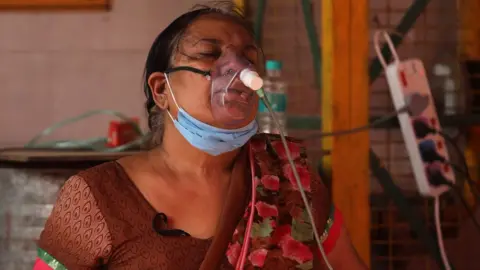India Covid aid: Is emergency relief reaching those in need?
 Getty Images
Getty ImagesAs India's devastating Covid-19 crisis mounted last month, countries around the world began sending emergency medical supplies to help stem the surge.
Planeloads of ventilators, medicines and oxygen equipment began pouring into India, from countries including the UK and the US, at the start of last week. By Sunday, some 300 tonnes of supplies on 25 flights had arrived at Delhi International Airport alone.
But - as cases continue to reach record levels across the country - concerns are mounting about delays in supplying the aid to those most in need.
For several days, much of the cargo sat in airport hangars as hospitals called for more support. The supplies did not begin being distributed until as late as Monday evening - more than a week after the first batch of emergency assistance arrived, state officials have told local media.
The Indian government has strongly denied there is a delay, issuing a statement on Tuesday evening saying it had introduced a "streamlined and systematic mechanism" for distributing the supplies. The health ministry said in the statement it was "working 24x7 to fast track and clear the goods".
But on the ground, officials in some of India's worst-hit states told the BBC that they had still not received any supplies.
 PA Media
PA MediaKerala - which recorded a record 37,190 new Covid cases earlier this week - had still not received any aid by Wednesday evening, the state's health secretary, Dr Rajan Khobragade, told the BBC.
Kerala's chief minister, Prinarayi Vijayan, separately called on India's Prime Minister Narendra Modi to "urgently" send Kerala some of the country's much-needed oxygen imports.
He asked that the equipment "be allotted to Kerala on a priority basis, considering the fact that Kerala has one of the highest active case loads in the country", in an open letter to Mr Modi on Wednesday.
'Where is it going?'
Some healthcare officials claim there has been little to no communication from the central government on how or when they would receive supplies.
"There's still no information about where it is being distributed," said Dr Harsh Mahajan, the president of the Healthcare Federation of India, which represents some of the country's biggest private hospitals.
"It seems people don't know - I've tried two or three places and been unable to find out," he added. "It's still not clear."
Some non-governmental groups involved in responding to the crisis also say they are frustrated by an apparent lack of information.
"I don't think anybody has any clarity on where aid is going," Pankaj Anand, Oxfam India's director of programme and advocacy, told the BBC. "There is no tracker on any website giving you an answer."
An alleged absence of information about the relief distribution effort is raising questions - even in foreign donor countries - about where the aid is going.
On Friday, the issue was raised at a US state department briefing, when a reporter demanded "accountability for the US taxpayers' money" being sent to India, and asked if the US government was tracking the aid's whereabouts.
"Rest assured that the United States is committed to making sure that our partners in India are taken care of in this crisis," the state department's spokesperson said in response.
The BBC asked the UK's Foreign, Commonwealth and Development Office if it had any knowledge of where the country's aid - including its shipments of more than 1,000 ventilators - had been distributed.
In response the FCDO said "the UK has been working with the Indian Red Cross and Government of India to ensure transfer of medical equipment from the UK is as efficient as possible".
"Distribution processes and decisions on exactly where support provided by the UK will be deployed are matters for the Government of India."
Opposition politicians in India have also called for the government to release more information about how its relief effort is going."We request and demand from the government... Share it with every Indian: Where has this aid come from, and where is it going?" said Pawan Khera, a spokesperson for the opposition Congress party. "You owe it to the public."
'Streamlined distribution'
It took the Indian government seven days to create a "streamlined mechanism" to distribute supplies to states, according to the health ministry.
 Getty Images
Getty ImagesIt began work on the plan on 26 April, and issued its Standard Operating Procedure (SOP) - guidelines on how to distribute aid - on 2 May, it said in a press release. It did not say when aid distribution began.
Even when shipments land in India, the distribution process is complex - involving various stages, ministries and outside agencies.
After relief flights arrive, aid is received by the Indian Red Cross Society, which is responsible for taking it through customs, according to the government's statement. The shipments are then handed over to another agency, HLL Lifecare, which handles the goods and subsequently transports them across the country.
Because supplies are arriving in various forms, authorities have to "unpack [and] repack" them before they can be dispatched, further slowing the process, the government admits.
"The materials from abroad are currently coming in different numbers, specifications and at different times," the government said. "In many cases the items received are not as per the list, or the quantities differ, which needs reconciling at the airport."
Once the materials are repacked, they are allocated to areas where "critical care patients load is high and where the need is highest".
'Working 24/7'
Despite the logistical challenges, India's central government says it is "working 24x7" to send supplies to strained areas. It said aid had been dispatched to some 38 institutions in 31 states by Tuesday evening.
One badly-hit state, Punjab, has received 100 oxygen concentrators and 2,500 doses of the life-saving drug remdesivir, a state official told the BBC on Wednesday.
The air force airlifted the "first batch" of 450 oxygen cylinders from the UK to Chennai (Madras) in southern Tamil Nadu state on Tuesday, the city's customs authority said on Twitter.
Allow X content?
Of 1,088 oxygen concentrators flown in from Hong Kong, some 738 remained in Delhi while 350 had been sent on Mumbai, a government minister said on Tuesday.
Meanwhile, trainloads of oxygen - nicknamed the "Oxygen Express" by officials - are being rushed to Delhi to help ease shortages in its hospitals.
Allow X content?
'Oxygen is essential'
Despite these efforts, India's hospitals are still in dire need of fresh medical supplies - and above all of oxygen.
The country reported a record 412,262 new daily coronavirus cases on Thursday and 3,980 virus-related deaths, the health ministry said. India accounted for nearly half of all reported Covid infections across the world last week, and a quarter of all deaths, according to the World Health Organization.
 Getty Images
Getty ImagesYet some healthcare professionals say what they need most urgently are not the foreign donations, but more on-site oxygen production facilities to be built at hospitals.
"Right now our only problem is oxygen," says Dr Mahajan. "Even if this aid comes or doesn't come, I don't think it's going to make a substantial difference. The oxygen generators will make the difference. That's what is most essential right now."
Two freshly installed medical oxygen plants - producing 1,000 litres per minute - would begin pumping supplies to hundreds of Covid-19 patients in Delhi on Wednesday evening, the health ministry said in a tweet.
But for many of those on the frontline of India's healthcare emergency, the wait for desperately needed support continues.
"It is frustrating," Dr Mahajan says. "We are overwhelmed... this wave has hit us, the incline has hit us - [and] it's like a jet taking off."
Additional reporting by the BBC's Soutik Biswas and Andrew Clarance in Delhi
